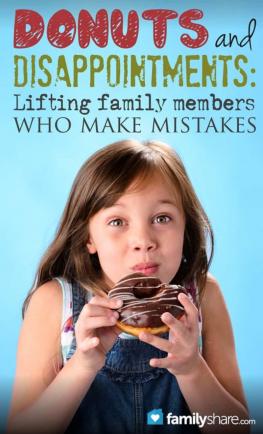
When I was a young girl, I loved donuts - and I still do. One day, my mom brought home a box of chocolate-covered donuts that sat in the cupboard, tempting me. Every time I opened the cupboard, they seemed to be calling my name. I couldn't resist and finally ate one. Then two. Then the whole box was empty, and I knew I was in trouble.
Later, my mom called me and my siblings into the front room and asked, "Who ate all the donuts?" We eyed each other warily, and I tried to cover my guilt with my best innocent-looking face. When no one confessed, I thought I had escaped punishment, and we were dismissed.
That little gnawing discomfort grew all evening until I could not sit alone with myself. I had indigestion, and it wasn't from eating too many donuts. I knew I had made a mistake, but confessing my fault seemed too difficult. When I could bear my guilt no longer, I finally went into my mom's room and told her the truth.
Her reaction was compassionate. She said, "I'm so glad you told me. I was very worried that whoever ate all those donuts would get sick." She calmly talked about problems that can happen when we eat too much sugar and accepted my apology. I felt such relief.
Children often make mistakes, big and small, as do spouses and parents. How we react to those mistakes correlates with the degree a person feels self-worth and confidence to rise above their mistake. Our reaction teaches them how approachable we are when they entrust us with their most tender, painful feelings.
Trust in themselves and trust in us depends on these four principles:
1. Separate the deed from the doer
Have you ever tried learning something new? Suppose it was how to hit a baseball and you kept striking out. Does that make you a failure as a person or at hitting a ball? No. You are still a good person who is trying to connect a ball with a bat. We need to remember when a child makes a wrong choice, she is just practicing at making a connection between choices and consequences. Bad behavior does not reflect who she really is.
Children are just beginners in life. They are practicing at becoming adults one day. We may not approve of their behavior, but we can express our acceptance and love of them. Appropriately respond to family members with "That was a bad choice, but I still love you." Those words are a home run!
2. Treat others with love and respect
If a parent or spouse uses toxic words, the erring family member will learn from the reaction to stay away. Think of hot flame. We quickly learn how far away we can stand from a fire depending on the intensity of the flames. If a parent reacts explosively ("How could you be so stupid?" "Why don't you ever use that head on your shoulders?" "I think you were born dumb!") the child will feel the heat and stay back.
On the other hand, if a family member approaches another and feels only love, respect and acceptance, he will learn he can trust that person with feelings that matter. Trusting family members with small, donut-sized sins will increase our confidence in trusting them with larger ones when they inevitably happen.
3. Admit our own wrongdoing
Craig A. Cardon, a religious leader and Harvard school graduate, made this observation: "As we consider our own lives and the lives of our loved ones and acquaintances, we should be equally willing to forgive ourselves and others."
We create a family atmosphere of safety when we openly admit to and correct our own mistakes. When those occasions arise, it is healthy to verbalize, for example, "Oh no! I just sat on my glasses and broke them because I left them out. Boy, I wish I had put them away. Oh well, I'll just have to throw them away and remember to take care next time." Or when we offend a family member, we can bond our hearts back together by admitting, "I blew it. I'm sorry. Will you forgive me?" Nothing is more elevating than humbling ourselves before those we love.
4. Express confidence and faith
Our children won't be children for long. Soon, they will be adults. What will those adults look and act like? They have such great potential; mistakes can be the stepping stones for learning and growing into a confident adult.
Thomas S. Monson said, "We can help [others] to overcome their shortcomings. We must develop the capacity to see men not as they are at present but as they may become." After a child has disappointed us, we should dust ourselves off, smile, and say, "Well, that surely was unlike you. I know you can do it right. Let's get back on track now, okay?" Likewise, expressing confidence and faith to a spouse is a sacred privilege we hold in partnership.
These are universal, interpersonal principles. They apply to anyone who wants others to show them love, acceptance, confidence and faith. How do you want to be treated when you make a mistake? Go back and read these four truths in the place of a child. As we stand in their small shoes, we remember how we should treat others. For this reason Christ said, " Whosoever therefore shall humble himself as this little child, the same is greatest in the kingdom of heaven" (Matthew 18:4).

